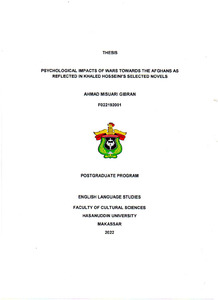Gibran, Ahmad Misuari (2022) PSYCHOLOGICAL IMPACTS OF WARS TOWARDS THE AFGHANS AS REFLECTED IN KHALED HOSSEINI'S SELECTED NOVELS. Thesis thesis, Universitas Hasanuddin.
![[thumbnail of cover]](/14905/1.hassmallThumbnailVersion/F022192001_tesis_28-03-2022%20cover1.png)

F022192001_tesis_28-03-2022 cover1.png
Download (295kB) | Preview
F022192001_tesis_28-03-2022 1-2.pdf
Download (1MB)
F022192001_tesis_28-03-2022 dp.pdf
Download (489kB)
F022192001_tesis_28-03-2022.pdf
Restricted to Repository staff only until 1 January 2027.
Download (3MB)
Abstract (Abstrak)
The purpose of this research is to find out how the continuous wars affect the emotional and mental development of people in Afghanistan. This is a descriptive qualitative research using psychoanalysis approach and ground theory of Sigmund Freud%u2019s concept of id, ego, and superego.The source of primary data was gathered from Khaled Hosseini%u2019s three novels,while the sources of secondary data were obtained from some other printed media, articles, and websites related to the topic The result of this analysis implied that the negative impacts of wars in Afghanistan were explained in each novel. The first novel The Kite Runner (2003) mentioned how Amir, the main protagonist, and a supporting character named Sohrab, demonstrated the development of their own mental conditions where the former tried to overcome his longtime guilt and the latter expressed his trauma when being enslaved by war criminals.The second novel titled A Thousand Splendid Suns (2007) described how Mariam, the main character, struggle to gain her right as a woman under the suppression of patriarchy and extremism, which indicated that she is dominated by her ego. The third novel is And The Mountains Echoed (2013) did not mention the direct impacts of wars on the characters. However, the indirect impact could be found in the flashback scene of a minor character named Uncle Nabi. In that scene, he had to take care of another character named Mr. Wahdati, who fell ill during the moment where Soviet-Afghan occurred, even though both of them did not became the direct victim of the conflict. Uncle Nabi%u2019s action in this flashback scene reflected the concept of ego where he would choose to take of the ailing Mr. Wahdati in spite of the harsh condition in his location.
| Item Type: | Thesis (Thesis) |
|---|---|
| Subjects: | P Language and Literature > P Philology. Linguistics |
| Divisions (Program Studi): | Fakultas Ilmu Budaya > Sastra Inggris |
| Depositing User: | Nasyir Nompo |
| Date Deposited: | 31 Mar 2022 05:37 |
| Last Modified: | 31 Mar 2022 05:37 |
| URI: | http://repository.unhas.ac.id:443/id/eprint/14905 |


